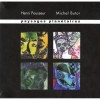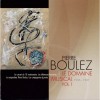Composers
Henri Pousseur (23 June 1929, Malmedy – 6 March 2009, Brussels) was a Belgian composer.
Pousseur studied at the Academies of Music in Liège and in Brussels from 1947 to 1952, where he joined the group called Variations associated with Pierre Froidebise. It was in this group that he first became familiar with the music of Anton Webern and other 20th-century composers. During his period of military service in 1952–53 at Malines he maintained close contact with André Souris. He encountered Pierre Boulez in 1951 at Royaumont, and this contact inspired his Trois chants sacrés, composed that same year. In 1953 he met Karlheinz Stockhausen, and in 1956 Luciano Berio (Decroupet 2009).
In 1954 he married Théa Schoonbrood with whom he had four children: Isabelle (1957), Denis (1958), Marianne (1961), and Hélène (1965).[citation needed]
Beginning around 1960, he collaborated with Michel Butor on a number of projects, most notably the opera Votre Faust (1960–68) (Decroupet 2009).
Pousseur taught in Cologne, Basel, and in the United States at SUNY Buffalo, as well as in his native Belgium. From 1970 until his retirement in 1988 he taught at the University and Conservatory of Liège where he also founded the Centre de recherches et de formation musicales de Wallonie. He died aged 79, on the morning of 6 March 2009, of bronchial pneumonia (Machart 2009).
Generally regarded as a member of the Darmstadt School in the 1950s, Pousseur's music employs serialism, mobile forms, and aleatory, often mediating between or among seemingly irreconcilable styles, such as those of Schubert and Webern (Votre Faust), or Pousseur's own serial style and the protest song "We shall overcome" (Couleurs croisées).
His electronic composition Scambi (Exchanges), realized at the Studio di Fonologia in Milan in 1957, is unusual in the tape-music medium because it is explicitly meant to be assembled in different ways before listening. When first created, several different versions were realized, two by Luciano Berio, one by Marc Wilkinson, and two by the composer himself (Sabbe 1977, 175n86). Since 2004, the Scambi Project, directed by John Dack at the Lansdown Centre for Electronic Arts at Middlesex University, has focussed on this work and its multiple possibilities for realization.
In addition to his compositional and teaching activities, Pousseur published many articles and ten books on music, amongst which are Fragments Théorique I: sur la musique expérimentale (Brussels: Université Libre de Bruxelles, 1970), Schumann le Poète: 25 moments d'une lecture de Dichterliebe (Paris: Klincksieck, 1993), and Musiques croisées (Paris: L'Harmattan, 1997).
Recently Added
| Country: | Belgium |
| Period: | Avant-garde |
Biography
Henri Pousseur (23 June 1929, Malmedy – 6 March 2009, Brussels) was a Belgian composer.
Pousseur studied at the Academies of Music in Liège and in Brussels from 1947 to 1952, where he joined the group called Variations associated with Pierre Froidebise. It was in this group that he first became familiar with the music of Anton Webern and other 20th-century composers. During his period of military service in 1952–53 at Malines he maintained close contact with André Souris. He encountered Pierre Boulez in 1951 at Royaumont, and this contact inspired his Trois chants sacrés, composed that same year. In 1953 he met Karlheinz Stockhausen, and in 1956 Luciano Berio (Decroupet 2009).
In 1954 he married Théa Schoonbrood with whom he had four children: Isabelle (1957), Denis (1958), Marianne (1961), and Hélène (1965).[citation needed]
Beginning around 1960, he collaborated with Michel Butor on a number of projects, most notably the opera Votre Faust (1960–68) (Decroupet 2009).
Pousseur taught in Cologne, Basel, and in the United States at SUNY Buffalo, as well as in his native Belgium. From 1970 until his retirement in 1988 he taught at the University and Conservatory of Liège where he also founded the Centre de recherches et de formation musicales de Wallonie. He died aged 79, on the morning of 6 March 2009, of bronchial pneumonia (Machart 2009).
Generally regarded as a member of the Darmstadt School in the 1950s, Pousseur's music employs serialism, mobile forms, and aleatory, often mediating between or among seemingly irreconcilable styles, such as those of Schubert and Webern (Votre Faust), or Pousseur's own serial style and the protest song "We shall overcome" (Couleurs croisées).
His electronic composition Scambi (Exchanges), realized at the Studio di Fonologia in Milan in 1957, is unusual in the tape-music medium because it is explicitly meant to be assembled in different ways before listening. When first created, several different versions were realized, two by Luciano Berio, one by Marc Wilkinson, and two by the composer himself (Sabbe 1977, 175n86). Since 2004, the Scambi Project, directed by John Dack at the Lansdown Centre for Electronic Arts at Middlesex University, has focussed on this work and its multiple possibilities for realization.
In addition to his compositional and teaching activities, Pousseur published many articles and ten books on music, amongst which are Fragments Théorique I: sur la musique expérimentale (Brussels: Université Libre de Bruxelles, 1970), Schumann le Poète: 25 moments d'une lecture de Dichterliebe (Paris: Klincksieck, 1993), and Musiques croisées (Paris: L'Harmattan, 1997).





